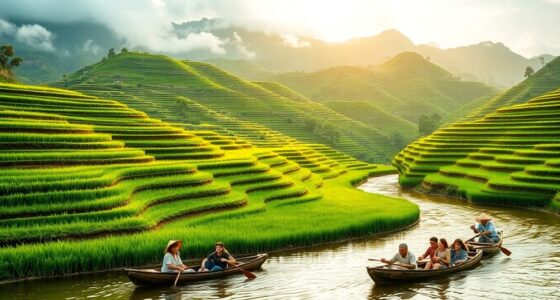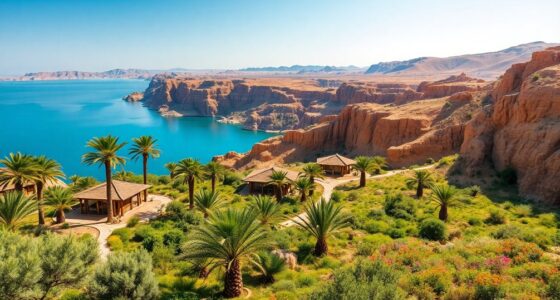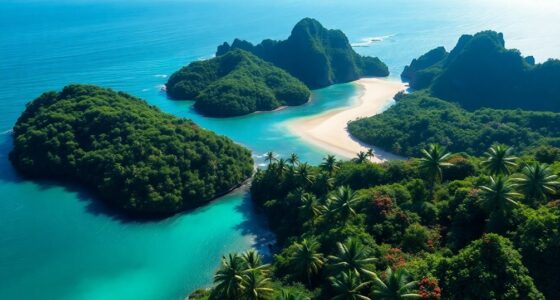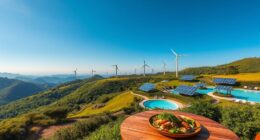South Korea’s Jeju Island Biosphere Reserve showcases stunning volcanic landscapes, including lava tubes, craters, and rugged coastlines that reveal the island’s fiery origins. You’ll find rich biodiversity, from endemic plants and unique species to vibrant marine life like reefs and dolphins. The area is woven with cultural traditions and community crafts, all supported by conservation efforts, sustainable tourism, and eco-friendly practices. If you keep exploring, you’ll discover the fascinating blend of natural wonders and cultural heritage that makes Jeju truly special.
Key Takeaways
- Jeju Island Biosphere Reserve protects diverse ecosystems, including volcanic terrains, forests, and marine habitats, supporting endemic species.
- It encompasses marine protected areas that conserve coral reefs, fish, and dolphin populations, promoting marine biodiversity.
- The reserve integrates traditional conservation practices with scientific research to sustain native flora and fauna.
- Ecotourism activities like snorkeling, hiking, and exploring lava tubes are promoted to minimize environmental impact.
- Preservation of cultural heritage and local communities is a key component of Jeju’s sustainable environmental management.
Unique Geological Features and Volcanic Landscapes
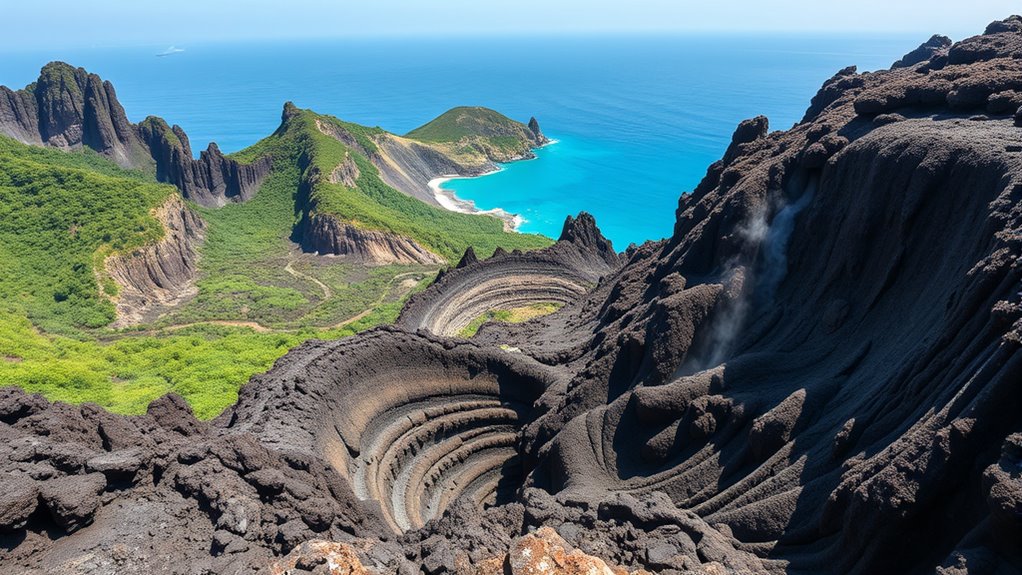
Jeju Island’s volcanic origins have shaped its striking geological features, making it a standout destination for nature enthusiasts. You’ll find an incredible network of lava tubes, formed when flowing lava cooled and solidified, creating tunnels underground that you can explore. These natural passages reveal the island’s fiery past and offer unique underground landscapes. Additionally, volcanic craters punctuate the terrain, with Hallasan Mountain’s summit crater dominating the skyline. These craters showcase the island’s active volcanic history, offering insight into past eruptions. The rugged coastline, dotted with lava formations and volcanic cones, further highlights Jeju’s dramatic volcanic landscape. Exploring these features allows you to witness the raw power of nature and appreciate the island’s geological significance firsthand.
Rich Biodiversity and Ecosystem Highlights
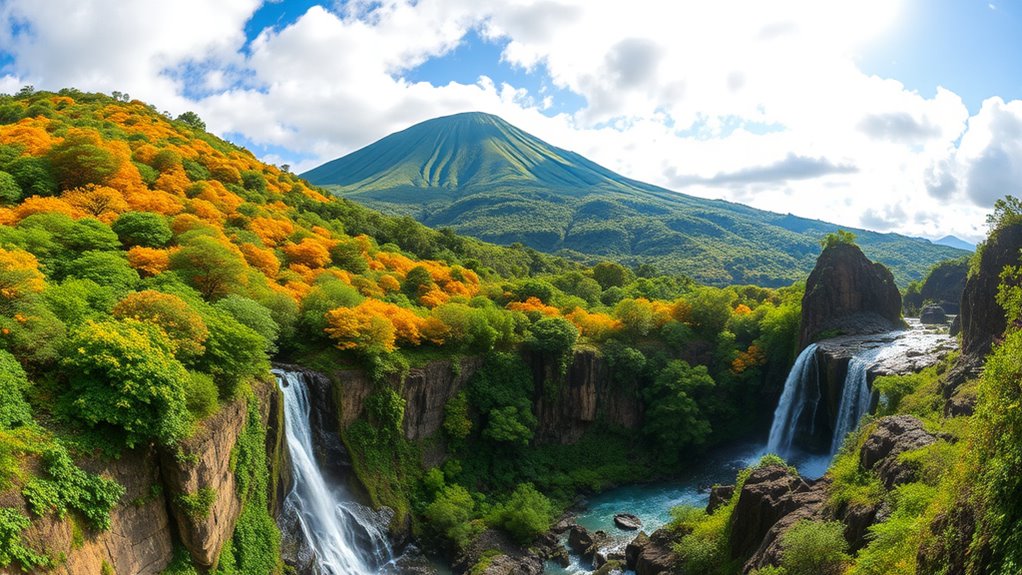
Have you ever wondered how a single island can host such a diverse array of plant and animal life? Jeju Island’s rich biodiversity stems from its varied ecosystems, including lush forests, volcanic landscapes, and vibrant marine habitats. You’ll find numerous endemic species, like the Jeju Canary and rare plants unique to the island. Marine habitats surrounding Jeju are teeming with life, supporting colorful reefs, schools of fish, and even dolphins. The island’s diverse ecosystems create a delicate balance that sustains both terrestrial and marine species. This biodiversity not only highlights Jeju’s ecological significance but also offers opportunities for conservation and eco-tourism. Exploring these habitats, you’ll witness firsthand how Jeju’s natural environment supports a stunning variety of life forms. Biodiversity hotspots on the island highlight the importance of protecting these fragile ecosystems for future generations.
Cultural Heritage and Local Communities
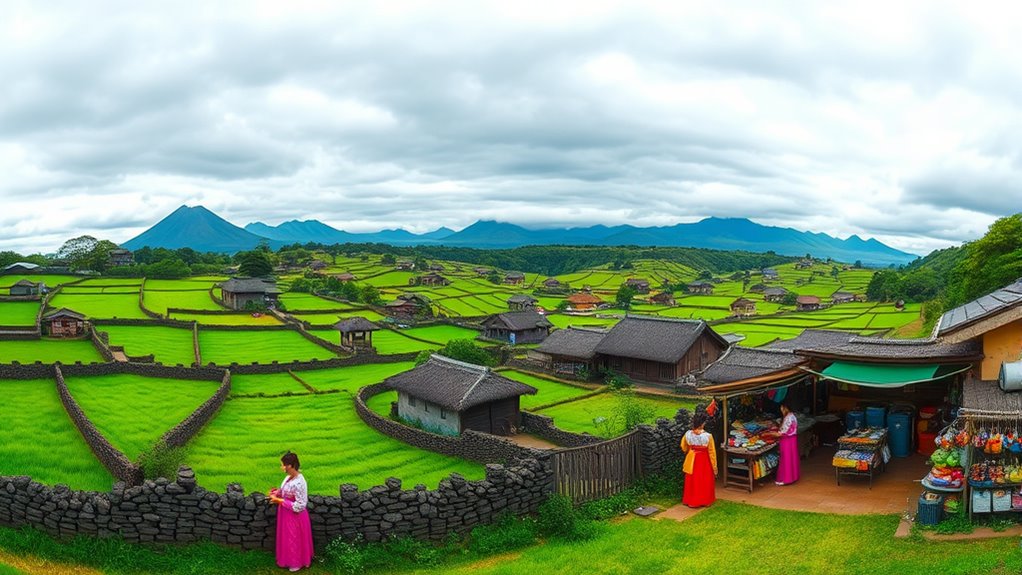
As you explore Jeju Island, you’ll discover a rich tapestry of cultural heritage shaped by centuries of tradition and local customs. The island’s communities take pride in their traditional crafts, like earthenware pottery and woven textiles, which reflect their unique history. You’ll also encounter vibrant local festivals that celebrate seasonal changes, harvests, and ancestral spirits, offering a glimpse into the islanders’ deep-rooted customs. These festivals often feature traditional music, dance, and food, strengthening community bonds and preserving cultural identity. Engaging with local artisans and participating in festivities allows you to experience Jeju’s authentic heritage firsthand. This vibrant cultural scene highlights the resilience and pride of Jeju’s residents, making your visit more meaningful and immersive. Additionally, the preservation of local crafts demonstrates the community’s dedication to maintaining their cultural legacy for future generations.
Conservation Strategies and Sustainable Practices
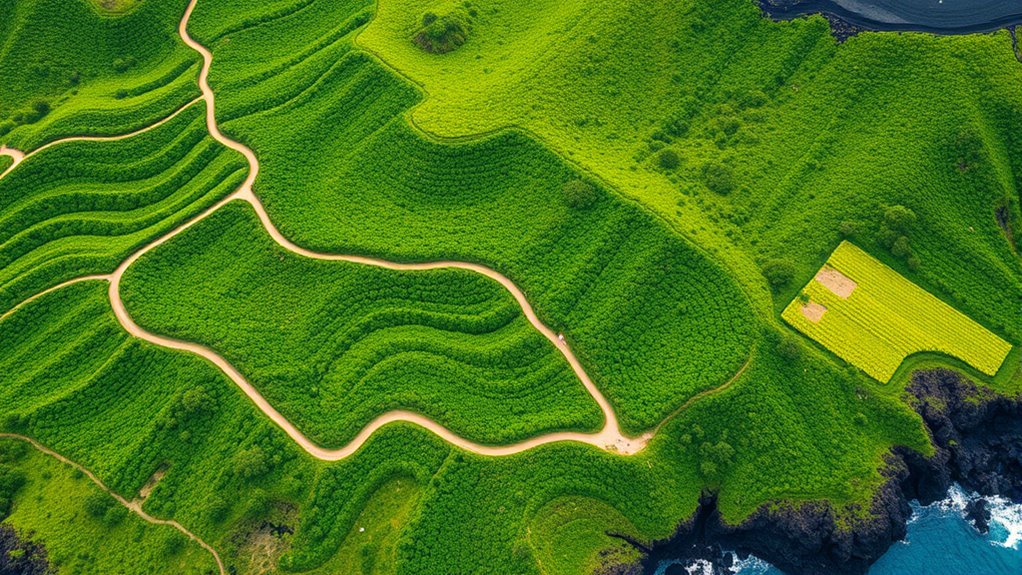
The vibrant cultural practices of Jeju Island are closely linked to its natural environment, prompting local communities and policymakers to adopt innovative conservation strategies. You’ll find that establishing marine protected areas helps safeguard critical habitats, ensuring fish populations and marine biodiversity thrive. These zones restrict harmful activities, allowing ecosystems to recover and maintain balance. Additionally, invasive species control plays a crucial role; efforts focus on removing non-native plants and animals that threaten native species and disrupt ecological harmony. By blending traditional knowledge with scientific approaches, Jeju’s conservation strategies promote sustainability and resilience. Your support and awareness can contribute to these initiatives, helping preserve Jeju’s unique landscapes and marine resources for future generations to enjoy and sustain. Implementing native species restoration programs further enhances ecological stability by promoting the growth of indigenous flora and fauna.
Tourist Attractions and Ecotourism Opportunities
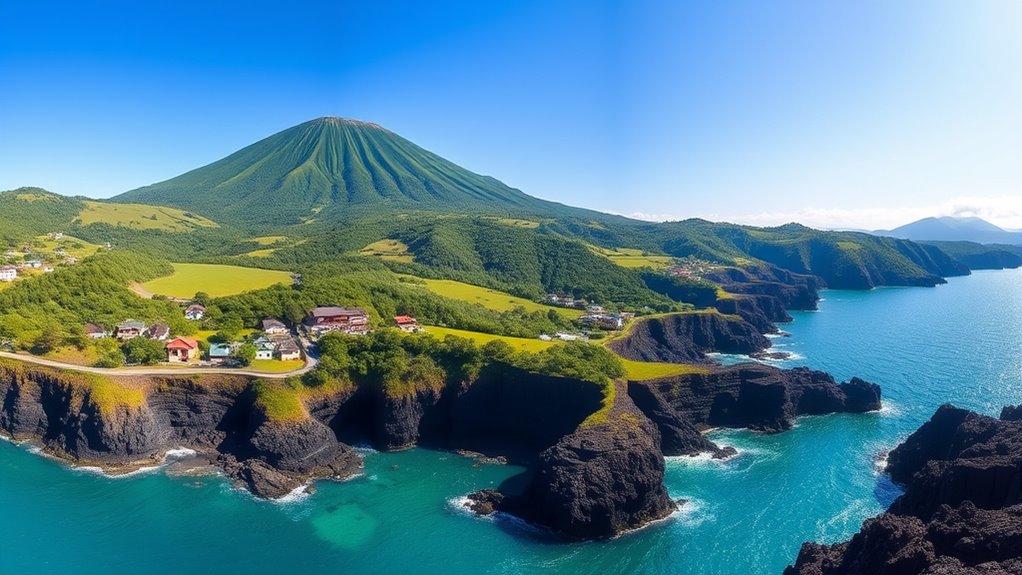
Jeju Island offers a wealth of tourist attractions that showcase its natural beauty and cultural heritage, making it a prime destination for eco-conscious travelers. You can explore vibrant marine sanctuaries where colorful coral reefs and diverse marine life thrive, perfect for snorkeling and diving adventures. Hiking trails wind through volcanic landscapes, lush forests, and scenic coastlines, offering breathtaking views and immersive experiences in nature. The Olle Trail network, in particular, allows you to walk along the island’s diverse terrain while observing its unique ecosystems. Many sites emphasize conservation and eco-friendly tourism, ensuring you enjoy Jeju’s beauty responsibly. Whether you’re snorkeling in protected waters or trekking scenic trails, these attractions highlight Jeju’s commitment to preserving its environment while welcoming visitors. Understanding production quantity variance can help in managing resource efficiency during tourism development projects to minimize environmental impact.
Frequently Asked Questions
How Does Jeju Island’s Biosphere Reserve Impact Local Economy?
You’ll find that a biosphere reserve like Jeju Island boosts the local economy through eco-tourism benefits, attracting visitors enthusiastic to experience its natural beauty and unique culture. This influx creates jobs and supports local businesses. Plus, it helps with cultural preservation, ensuring local traditions and heritage thrive amid tourism growth. Overall, the reserve promotes sustainable development, balancing economic gains with environmental and cultural stewardship for the community.
What Are the Main Threats to Jeju’S Biodiversity?
Imagine a delicate tapestry unraveling—this is what threatens Jeju’s biodiversity. Invasive species like the black rabbit disrupt native ecosystems, while habitat fragmentation from development splits habitats into isolated patches. These threats weaken the resilience of local flora and fauna, risking their survival. If unchecked, these issues could cause irreversible damage, turning Jeju’s vibrant landscapes into a fragmented, less resilient environment.
How Do Local Communities Participate in Conservation Efforts?
You can see that local communities participate in conservation efforts through active community involvement and by preserving traditional practices. They organize clean-up campaigns, monitor local wildlife, and promote eco-friendly tourism. Many communities also maintain traditional practices that support biodiversity, like sustainable farming and fishing methods. By engaging in these activities, you help protect natural resources, ensuring the environment remains healthy and resilient for future generations.
Are There Any Endangered Species Unique to Jeju Island?
You might be surprised to learn that Jeju Island hosts some rare endemic species, facing unique conservation challenges. These species, found only here, need your support to thrive amid habitat changes. Protecting their delicate ecosystems becomes a shared responsibility, ensuring these natural treasures endure for future generations. Your awareness and efforts can make a real difference in preserving Jeju’s extraordinary biodiversity, keeping its endemic species safe from the brink.
What Future Research Is Planned for Jeju’S Ecosystem Preservation?
You’re interested in future research for ecosystem preservation. Researchers plan to focus on marine conservation and climate adaptation strategies to protect Jeju’s unique environment. They aim to study how changing ocean conditions affect marine life and develop methods to enhance ecosystem resilience. This research will guide sustainable management practices, ensuring Jeju’s biodiversity thrives amid climate shifts. Your involvement can support these efforts by promoting awareness and encouraging responsible tourism.
Conclusion
As you explore Jeju Island’s stunning landscapes, you’ll witness a breathtaking blend of volcanic marvels and vibrant ecosystems that seem to whisper stories of ancient Earth. By embracing its rich cultural heritage and supporting sustainable practices, you help preserve this jewel’s unmatched beauty. Imagine standing amidst a living, breathing masterpiece so spectacular it outshines the stars—Jeju’s biosphere reserve is truly a treasure you’ll carry in your heart forever.



